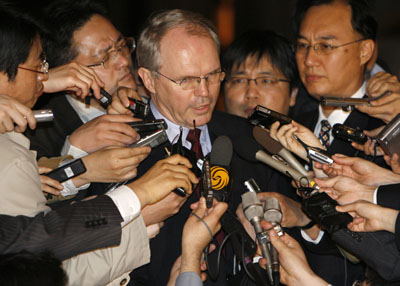Asia-Pacific
US: North Korea funds deadlock broken
(AP)
Updated: 2007-04-11 08:34
 |
Large Medium Small |
"Authorized account holders, as of now, will be able to access the funds in those accounts," spokesman Sean McCormack told reporters. "We'll see if they take 'yes' for an answer."
McCormack cited comments from authorities in the Chinese territory of Macau, where the money is held by the Banco Delta Asia, which has been blacklisted by Washington for allegedly helping North Korea launder money.
A call to a spokesman for the bank was not immediately returned, and a statement by the Macau government said only that Macau was cooperating in the matter.
McCormack maintained the money had been freed for withdrawal, a position shared by South Korea.
"North Korean account holders can withdraw the money in all of the accounts," the South's nuclear envoy, Chun Young-woo, told reporters in Seoul, where he was meeting with the top US negotiator Christopher Hill. Chun said the money would be available Wednesday morning.
Pyongyang had insisted the money be released before it would begin operations to close its Yongbyon nuclear reactor as required by the February agreement.
Under that deal, the North has until April 14, Saturday, to close the plant. McCormack acknowledged that closing and sealing the plant in four days might pose safety problems, suggesting a possible extension.
"We are now bumping up against the technical ability to safely shut down all the facilities related to Yongbyon," McCormack said. "We'll see where we are on Saturday."
In South Korea, Hill, an assistant secretary of state, expressed optimism the deadline could now be met.
"It's obviously a big step that I think should clear the way for the (North) to step up the process of dealing with its obligations within the 60-day period," Hill said, referring to the Saturday deadline.
If North Korea follows through with its promises, they would be the first moves the communist state has made to scale back its nuclear development since it kicked out international inspectors and in 2003 restarted its sole operating nuclear reactor.
The hard-won agreement, reached four months after North Korea rattled the world by testing a nuclear device, has been held up by a dispute over the frozen funds.
Victor Cha, President George W. Bush's top adviser on North Korea, met Tuesday with the country's top nuclear negotiator, Kim Kye Gwan, according to a U.S. official with knowledge of the meeting who spoke on condition of anonymity because of the sensitivity of the talks.
The official said Cha told Kim that North Korea was running out of time to act on the agreement.
Cha is part of a US delegation, including New Mexico Gov. Bill Richardson and Anthony Principi, Bush's former veterans affairs secretary, on a four-day trip to Pyongyang to recover remains of American servicemen killed in the 1950-53 Korean War.
The North agreed to shut its main reactor only after the United States promised to resolve the financial issue within 30 days, which Washington failed to do because it said the fund transfer has been mired in technical complications.
Kim told Principi on Monday that his government would allow UN nuclear inspectors into the country as soon as the $25 million (euro18.6 million) is released.
The only immediate cost the impoverished North would suffer for not shutting down the reactor by the deadline would be an initial 50,000-ton (45,360-metric ton) shipment of heavy fuel oil promised as a reward. That shipment was part of 1 million tons of oil it would get for dismantling its nuclear programs.
| 分享按鈕 |


